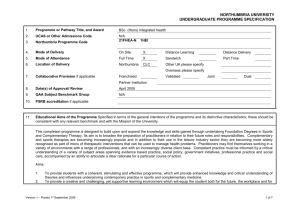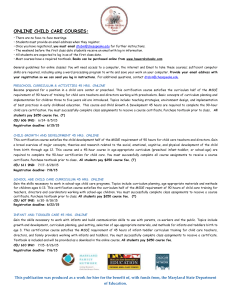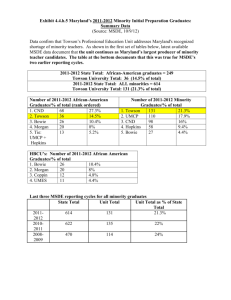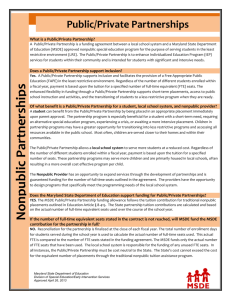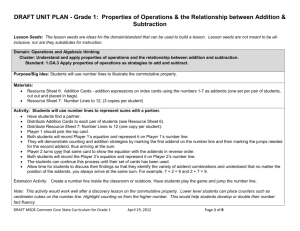(Hons) Manufacturing Systems and Design
advertisement
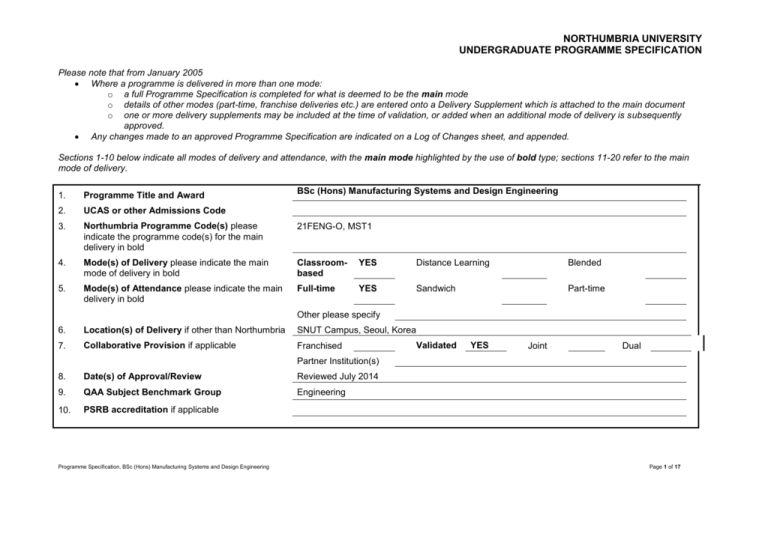
NORTHUMBRIA UNIVERSITY UNDERGRADUATE PROGRAMME SPECIFICATION Please note that from January 2005 Where a programme is delivered in more than one mode: o a full Programme Specification is completed for what is deemed to be the main mode o details of other modes (part-time, franchise deliveries etc.) are entered onto a Delivery Supplement which is attached to the main document o one or more delivery supplements may be included at the time of validation, or added when an additional mode of delivery is subsequently approved. Any changes made to an approved Programme Specification are indicated on a Log of Changes sheet, and appended. Sections 1-10 below indicate all modes of delivery and attendance, with the main mode highlighted by the use of bold type; sections 11-20 refer to the main mode of delivery. BSc (Hons) Manufacturing Systems and Design Engineering 1. Programme Title and Award 2. UCAS or other Admissions Code 3. Northumbria Programme Code(s) please indicate the programme code(s) for the main delivery in bold 21FENG-O, MST1 4. Mode(s) of Delivery please indicate the main mode of delivery in bold Classroombased YES Distance Learning Blended 5. Mode(s) of Attendance please indicate the main delivery in bold Full-time YES Sandwich Part-time Other please specify 6. Location(s) of Delivery if other than Northumbria SNUT Campus, Seoul, Korea 7. Collaborative Provision if applicable Franchised Validated YES Joint Dual Partner Institution(s) 8. Date(s) of Approval/Review Reviewed July 2014 9. QAA Subject Benchmark Group Engineering 10. PSRB accreditation if applicable Programme Specification, BSc (Hons) Manufacturing Systems and Design Engineering Page 1 of 17 NORTHUMBRIA UNIVERSITY UNDERGRADUATE PROGRAMME SPECIFICATION Sections 11 – 20 relate to the main delivery as indicated in bold above. 11. Educational Aims of the Programme Specified in terms of the general intentions of the programme and its distinctive characteristics; these should be consistent with any relevant benchmark and with the Mission of the University. The programme aims to:- 12. Produce graduates in Manufacturing Systems and Design Engineering with the necessary skills and attributes to take roles within industry as Professional Engineers. Produce graduates who can apply fundamental principles and techniques to produce creative and innovative solutions to engineering problems. Equip students with an awareness of engineering in the wider economic and social context. Offer a challenging programme that is current, relevant, and informed by staff research, consultancy and professional experience. Provide wide opportunities for access, consistent with Professional Body requirements. Provide the opportunities for students to achieve their full potential. How Students are Supported in their Learning/Employability/Career Development eg curriculum design, personal development plans, placements, fieldwork, practical projects. - Development of transferable/key skills throughout the programme. All students undertake major project work within later stages of the programme. Curricula are designed with very strong vocational/professional emphasis, informed directly by industrial expertise of staff and industrial liaison committees. Encourage direct industrial input into programmes, including the use of visiting lecturers. A broad range of assessment techniques require students to demonstrate a range of transferable skills including teamwork, presentation skills, IT and numeracy, time management. Promote the secondment of native English speaking lecturing staff. Promote opportunity to study in UK at Northumbria University including sandwich placements. Programme Specification, BSc (Hons) Manufacturing Systems and Design Engineering Page 2 of 17 NORTHUMBRIA UNIVERSITY UNDERGRADUATE PROGRAMME SPECIFICATION 13. Learning Outcomes of Programme Specified in terms of performance capabilities to be shown on completion of the programme/pathway. Please identify numerically to correspond to the map of learning outcomes in section 18. a) Knowledge and Understanding A1. A2. A3. A4. A5. A6. A7. A8. Manufacturing Science with advanced work in Process Technology and Manufacturing Systems. Mathematical methods relevant to the Engineering subjects covered. Characteristics and selection of engineering materials for cost effective performance. The advantages of using IT for finding and communicating information and for complex analysis. The principles of design and techniques to develop products and related manufacturing processes. Codes of practice, the regulatory framework and health and safety. The organization of companies and their business practices; finance, law, marketing and quality. The global and social responsibilities of engineers and the environmental impact of their activity. b) Intellectual Skills B1. B2. B3. B4. B5. B6. Define problems and identify the key issues/parameters affecting their solution. Select and apply scientific principles to model Manufacturing processes. Produce innovative solutions to problems through the application of Engineering principles. Select appropriate mathematical and computer based methods to analyze non-routine Manufacturing systems. Create new products through the synthesis of experience, knowledge, concepts and ideas. Recognize business opportunities and undertake technical and commercial risk evaluations. c) Practical Skills C1. C2. C3. C4. C5. C6. C7. C8. Plan and conduct an investigative or development project subject to technical, time and commercial constraints. Use appropriate methods for modelling and analysing manufacturing engineering problems. Use relevant instrumentation and test equipment and evaluate the accuracy of data obtained. Apply IT methods, data searches, CAD, modelling, FEA, and PLC, CNC and Macro programming. Design a component, system or process and demonstrate its feasibility through testing or simulation. Produce a System Design Specification. Produce and understand Technical Drawings. Take and interpret notes and keep records. Log events and decisions for use as evidence. Programme Specification, BSc (Hons) Manufacturing Systems and Design Engineering Page 3 of 17 NORTHUMBRIA UNIVERSITY UNDERGRADUATE PROGRAMME SPECIFICATION C9. Present a critical evaluation or technical analysis, formally or informally. C10. Make a persuasive presentation. C11. Manage time, projects and people effectively and safely. d) Transferable/Key Skills D1. D2. D3. D4. D5. D6. D7. D8. D9. 14. Manipulate and sort data and present results in the most appropriate way. Apply an engineering approach to the solution of problems using scientific principles. Use general and office IT tools. Use creativity and, where appropriate, innovate in problem solving. Have the confidence to make value judgments based on limited or contradictory information. Adapt to working productively in unfamiliar environments. Understand the importance of teamwork, leadership and negotiation skills. Chair meetings and discussions, summarize arguments and ensure tasks are allocated fairly. Undertake self-evaluation and identify specific areas for personal development or future CPD. Learning, Teaching and Assessment Strategy Specified to enable learners to achieve and demonstrate the above learning outcomes. Learning and Teaching The teaching and learning strategy employed on this programme has been developed from broad experience and reflection to support effective learning and achievement of the programme aims. This requires that different approaches to curriculum delivery and assessment are utilised where suited to the individual module objectives and in support of that module contributing to the overall programme aims. In addition to lectures and seminars the programme will also employ; problem solving and project work, practical, design and group work where appropriate. The core method for the acquisition of knowledge is through the structured use of formal lectures, small group seminars and laboratory exercises. These methods are further supported by experiences derived from capstone design, make and test exercises, case studies and projects. Assessment is an important part of any academic programme and both summative and formative assessment are used constructively within the programme to support student learning, ensure learning outcomes are achieved and enable the student to understand the progress of their own learning. Summative assessment tasks include; exams, assignments, presentations and laboratory and project reports. Formative assignment tasks and the feedback it generates are valued components of the student learning process and provide an opportunity for students to understand the progress of their own learning. Unseen examinations are employed to assess outcomes A1-4, A6-8, B1-6, and D1-5. Design and project reports, presentations are employed for A3-6, Programme Specification, BSc (Hons) Manufacturing Systems and Design Engineering Page 4 of 17 NORTHUMBRIA UNIVERSITY UNDERGRADUATE PROGRAMME SPECIFICATION A8, B1-6, C1,C4-7, C10 and D1-9. In addition seminar work and laboratory reports are employed in A1-3, C1-5, C8-11 and D4-5. 15. Programme Structure This section should be completed with reference to the Modularised Framework for Northumbria Awards.2. Diagrams can also be used to demonstrate the structure. Programme Structure Refer if necessary to appended diagrams Level 4 See separate structure diagram. Level 5 See separate structure diagram. Level 6 See separate structure diagram. 2 The Modularised Framework for Northumbria Awards available from http://Northumbria.ac.uk/sd/central/ar/lts/approval/framework/ Programme Specification, BSc (Hons) Manufacturing Systems and Design Engineering Page 5 of 17 NORTHUMBRIA UNIVERSITY UNDERGRADUATE PROGRAMME SPECIFICATION 16. Lower Level Awards Credit Structure and Programme Learning Outcomes for Lower Level Awards. Please delete or add rows as appropriate, with reference to the Assessment Regulations for Northumbria Awards3 Learning outcomes should be specified for each lower level award in accordance with the QAA Framework for Higher Education Qualifications 4 which also provides generic qualification descriptors for each level. The standard credit structure for each award is given below. The Modularised Framework for Northumbria Awards2 indicates permitted variations and allows programmes to be validated with some lower or higher level credit (e.g. the Certificate of Higher Education (120 credits at Level 4) can be validated with up to 30 Level 3 credits). Award Programme Learning Outcomes may be completed with reference to section 13. Certificate of Higher Education See LO’s grid. 120 credits at Level 4 Higher National Certificate (Higher National Diploma programmes only) Not applicable 150 credits: 120 credits at Level 4; 30 credits at Level 5. 2 The Modularised Framework for Northumbria Awards available from http://Northumbria.ac.uk/sd/central/ar/lts/approval/framework/ The Assessment Regulations for Northumbria Awards available from http://Northumbria.ac.uk/sd/central/ar/lts/approval/assess/ 4 There is a link to the QAA Framework for Higher Education Qualifications at http://Northumbria.ac.uk/sd/central/ar/lts/approval/ 3 Programme Specification, BSc (Hons) Manufacturing Systems and Design Engineering Page 6 of 17 NORTHUMBRIA UNIVERSITY UNDERGRADUATE PROGRAMME SPECIFICATION Diploma of Higher Education See LO’s grid 240 credits: 120 credits at Level 4; 120 credits at Level 5. Programme Specification, BSc (Hons) Manufacturing Systems and Design Engineering Page 7 of 17 NORTHUMBRIA UNIVERSITY UNDERGRADUATE PROGRAMME SPECIFICATION B.Sc (Hons) Manufacturing Systems and Design Engineering Knowledge and Understanding Semester 1 Semester 2 Level 5 Semester 2 Level 4 Semester 1 A 1 A 2 A 3 A 4 A 5 A 6 Learning Outcomes Matrix Intellectual Abilities A 7 A 8 B 1 B 2 B 3 B 4 B 5 B 6 Practical Skills C 1 C 2 C 3 C 4 C 5 C 6 C 7 C 8 Transferable/Key Skills C 9 C 1 0 C 1 1 D 1 D 2 D 3 D 4 D 5 D 6 D 7 MSDE 213 MSDE 218 MSDE 220 MSDE 223 MSDE 231 MSDE 290 MSDE 214 MSDE 216 MSDE 217 MSDE 232 MSDE 240 MSDE 291 MSDE 323 MSDE 322 MSDE 328 MSDE 350 MSDE 360 MSDE 340 MSDE 310 MSDE 324 MSDE 332 MSDE 321 MSDE 345 Programme Specification, BSc (Hons) Manufacturing Systems and Design Engineering Page 8 of 17 D 8 D 9 Semester 1 Semester 2 Level 6 NORTHUMBRIA UNIVERSITY UNDERGRADUATE PROGRAMME SPECIFICATION MSDE 346 MSDE 422 MSDE 424 MSDE 435 MSDE 471 MSDE 472 MSDE 423 MSDE 425 MSDE 431 MSDE 452 MSDE 473 Programme Specification, BSc (Hons) Manufacturing Systems and Design Engineering Page 9 of 17 NORTHUMBRIA UNIVERSITY UNDERGRADUATE PROGRAMME SPECIFICATION B.Sc (Hons) Manufacturing Systems and Design Engineering Level 4 (Sophomore) Level 5 (Junior) Semester 1 Semester 2 Semester 1 Semester 2 Engineering Engineering CAD II Dynamics Mathematics I Mathematics II Level 6 (Senior) Semester 1 Semester 2 Capstone Design I (2 Capstone Design II units) (2 units) MSDE 213 Introduction to Manufacturing MSDE 214 Energy Studies MSDE 322 Design of Machine Elements MSDE 422 Computer Aided Engineering MSDE 423 Design of Molded Products MSDE 231 Mechanics of Materials MSDE 216 Materials Technology MSDE 323 Database Management MSDE 424 Introduction to MEMS/Nano Technology MSDE 425 Management of Manufacturing Systems MSDE 217 MSDE 328 MSDE 471 MSDE 431 MSDE 310 Computer Integrated Manufacturing MSDE 321 Intermediate Engineering Design MSDE 324 MSDE 218 CAD I Applied Statistics in Manufacturing MSDE 220 Computer Programming Control MSDE 232 Electronics I Electronics II MSDE 340 Digital Image Processing MSDE 240 MSDE 223 Communications I Communications II Microsystems Packaging MSDE 341 Microprocessor and Computer Automation in Manufacturing MSDE452 MSDE 472 Introduction to Microelectronics Processing MSDE 346 MSDE 360 Operations Research/ Management Science Programme Specification, BSc (Hons) Manufacturing Systems and Design Engineering Logistics Management Nano Equipment Laboratory MSDE 473 MSDE 435 Measurement and Instrumentation Page 10 of 17 NORTHUMBRIA UNIVERSITY UNDERGRADUATE PROGRAMME SPECIFICATION MSDE 290 MSDE 291 Programme Specification, BSc (Hons) Manufacturing Systems and Design Engineering MSDE 350 MSDE 345 Page 11 of 17 NORTHUMBRIA UNIVERSITY UNDERGRADUATE PROGRAMME SPECIFICATION 19. Admission Requirements including approved arrangements for admission with advanced standing, where appropriate. The ability to benefit from Northumbria University programmes is assessed on a combination of academic and personal qualities which can be demonstrated in a number of ways. Successful completion of a GCE or VCE Advanced level course of study (or some other equivalent qualification) is just one way. Students who can in other ways demonstrate their ability to benefit from a Northumbria University programme, in particular mature students without formal qualifications, will always be considered and are invited to contact the admissions tutor to discuss their application. Applicants should use the personal statement on their application to illustrate their abilities, aptitudes, skills, qualifications and experiences which might be taken into account as well as or instead of any of the formal qualifications listed below. It is University policy to recognise a wide variety of evidence, and potential applicants may wish to discuss this aspect of their application with the admission tutor. Students are interviewed after the Freshman year for entry in to the NU programme at Level 4. 20. Application Procedure Amend as appropriate - Direct to SNUT. Opportunity for all applicants to visit an Open Day. Programme Specification, BSc (Hons) Manufacturing Systems and Design Engineering Page 12 of 17 NORTHUMBRIA UNIVERSITY UNDERGRADUATE PROGRAMME SPECIFICATION LOG OF CHANGES Any changes made to an approved Programme Specification (other than typographical corrections) should be logged below and the sheet appended to the Programme Specification. Subsequent changes can then be added. Where it is not practicable to change an existing Programme Specification, a new version is required. Change takes effect Stage/yea r of program me eg Year 3 Semester/ academic year eg S2;05/06 Programme title(s) Admin change1 Y/N Programme code(s) affected by change Date of approval / amendment Brief summary of change to Programme Specification (including section number) 1. 2. 3. 4. 1 Administrative changes are defined in section of Approval Processes for Taught Programmes and Modules http://northumbria.ac.uk/sd/central/ar/lts/approval/ Programme Specification, BSc (Hons) Manufacturing Systems and Design Engineering Page 13 of 17 NORTHUMBRIA UNIVERSITY UNDERGRADUATE PROGRAMME SPECIFICATION HEAR SUPPLEMENT The HEAR Supplement should be completed for all new and existing undergraduate honours degrees. Information in sections 7, 8 and 9 should apply to students gaining awards in the current academic year for all deliveries within the same route (and the possibility that this could differ from related information in the main programme specification). Once approved, it will be entered by Faculty support staff onto SITS and will be reviewed annually. 1. Academic Year 2. Northumbria Programme Title and Route Code 3. Mode/s of Attendance Full Time Sandwich Part Time Other please specify 4. Partner Institution/s 5. Date of Approval 6. Programme Entry Requirements (150 words maximum) The following generic statement can be edited as appropriate to reflect any subject specific requirements1 As well as GCE and VCE ‘A levels’, the University accepts a wide range of entry qualifications including BTEC National Awards, Scottish Highers and Advanced Highers, Irish Leaving Certificate, Access courses and the International Baccalaureate. Entry requirements are usually expressed as UCAS tariff points and can be found in programme specifications and the on-line prospectus. In addition to achieving the UCAS tariff points for entry to the programme, students must also be able to demonstrate that they have studied an appropriate minimum number of units at Level 3, which is usually not less than two full GCE or VCE A levels or equivalent (though for programmes at sub degree level this requirement is usually not less than one full GCE or VCE A level or equivalent). Applicants may be required to have studied a particular subject or subjects to a certain level. Where the first language is not English, an IELTS score of 6.0 (with a minimum score of 5.5 in each component) will normally be required for entry. Students may be admitted to the programme with advanced standing based on accredited prior learning or accredited prior experiential learning. Programme Specification, BSc (Hons) Manufacturing Systems and Design Engineering Page 14 of 17 NORTHUMBRIA UNIVERSITY UNDERGRADUATE PROGRAMME SPECIFICATION 7. Programme Statement (250 words maximum) This should be written primarily for an external audience (e.g. employers) clarifying the aims of the programme, pathways, professional body implications (including where an alternative award title indicates that professional requirements have not been met) and opportunities for work experience/placements or study abroad. Please note that further information on professional status is required in section 10 below. Programme Specification, BSc (Hons) Manufacturing Systems and Design Engineering Page 15 of 17 NORTHUMBRIA UNIVERSITY UNDERGRADUATE PROGRAMME SPECIFICATION 8. Learning Outcomes applicable to students gaining awards in the current academic year. If these are the same as the main programme specification, please indicate ‘see section 13 of the main specification’ below, noting that information will need to be extracted from the main programme specification for entry onto SITS. The learning outcomes for an Honours degree are as follows: Programme Specification, BSc (Hons) Manufacturing Systems and Design Engineering Page 16 of 17 NORTHUMBRIA UNIVERSITY UNDERGRADUATE PROGRAMME SPECIFICATION An unclassified degree or lower level qualification may also be awarded where students have not met all learning outcomes. 9. Professional status (100 words maximum) Please provide a statement on the professional status of the programme for students graduating in the current academic year, noting the following extract from guidance from the Higher Education Better Regulation Group (HEBRG)2 for the collection of data for the KIS: The outcome of a successful programme accreditation by a PSRB may include one or more of the following: 1. 2. 3. 4. 5. Graduates are able to practise as a professional in a specific field, and in some cases receive a licence to practise that is required by law; Graduates are granted chartered status; Graduates are granted exemption from all or part of professional exams; Graduates are eligible for entry to membership of a professional association or learned society; The programme is confirmed as meeting externally designated standards and quality. If not applicable, this section should be left blank and a default statement will appear on the HEAR. The programme is confirmed as meeting externally designated standards and quality. Programme Specification, BSc (Hons) Manufacturing Systems and Design Engineering Page 17 of 17



